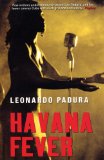Summary | Excerpt | Reviews | Beyond the Book | Readalikes | Genres & Themes | Author Bio

That desperate act of offering a few, genuinely or would-be
valuable volumes, or putting on sale boxes, yards, shelves, even
entire collections assembled over one or more lifetimes, raised
conflicting hopes in the dreams of buyers and sellers. The former
always claimed they were offering bibliographical jewels and were
eager to hear figures that might assuage the guilt the majority
suffered when they off-loaded their closest travelling companions
on the voyage through life. The latter revived a mercantile spirit
they’d thought banned from their island, and tried to make a
purchase they could later transform into a killing by arguing that
the volumes in question had scant value or commercial potential.
In his early days in this new profession, Mario Conde had tried
to turn a deaf ear to the stories behind the libraries that fell into his
hands. His years as a detective had forced him to live surrounded by
sordid files, but this hadn’t made him immune to the sorrows of the
soul and, when he got his way and left the police force, he discovered
painfully that the dark side of life still pursued him. Every library
for sale was a romantic novel with an unhappy ending, the drama
of which didn’t depend on the quantity or quality of books being
sacrificed, but on the paths along which the volumes had reached
that particular house and the terrible logic now sending them to be
slaughtered in the marketplace. Nevertheless, the Count quickly
learnt that listening was an essential part of the business, because
the majority of owners felt the need to discuss the reasons behind
their decisions, sometimes dolling them up, sometimes stripping
them bare, as if that act of confession at least salvaged a shred of
their dignity.
Once the scars had healed, Conde began to see the romantic
side of his role as a listener – he liked to describe himself as such
– and started to weigh up the literary potential in those stories,
often taking them on board as material for his ever deferred
aesthetic endeavours. As he sharpened his insights, so he felt able to
distinguish when a narrator was genuine or a pathetic liar, spinning
a yarn in order to be better reconciled with his conscience, or
merely to showcase his merchandise.
The more he penetrated the mysteries of his trade, the more
Mario Conde realized he preferred the exercise of buying to the
subsequent selling of the tomes he acquired. The act of selling
books in a doorway, on a park bench, on the bend of a promising
pavement, fanned smouldering remains of ravaged pride but
above all provoked frustration at having to get rid of an item
he’d often have preferred to retain. Consequently, although his
earnings plunged, he adopted the strategy of working only as a
trawler, replenishing the stocks of other street-sellers. From then
on, when prospecting for mines of books, like all his colleagues in
the city, the Count employed three complimentary, occasionally
conflicting techniques: firstly, the most traditional: visiting someone
who’d asked him to pay a call, as a result of his well-established
reputation as a fair buyer; then, the embarrassing, almost medieval
procedure of hawking – “I buy old books”, “I’m the man to
take those old books off your hands”; or the most in-your-face,
knocking optimistically on doors and asking whoever opened
up if they were interested in selling a few well-worn books. The
second of those commercial approaches was the most productive
in outlying, perpetually impoverished districts that were generally
quite unfruitful – though there was the occasional surprise – and
where the art of buying and selling the impossible had for years
been the survival system for hundreds of thousands of people. On
the other hand, the “truffle” method of sniffing out houses was
necessary in once aristocratic districts like El Vedado, Miramar
and Kohly, and in parts of Santos Suárez, El Casino Deportivo
and El Cerro, where people, in the teeth of the poverty spreading
across the nation, struggled to preserve increasingly obsolete ways
of life.
Excerpted from Havana Fever by Leonardo Padura Copyright © 2009 by Leonardo Padura. Excerpted by permission of Bitter Lemon Press. All rights reserved. No part of this excerpt may be reproduced or reprinted without permission in writing from the publisher
Your guide toexceptional books
BookBrowse seeks out and recommends the best in contemporary fiction and nonfiction—books that not only engage and entertain but also deepen our understanding of ourselves and the world around us.